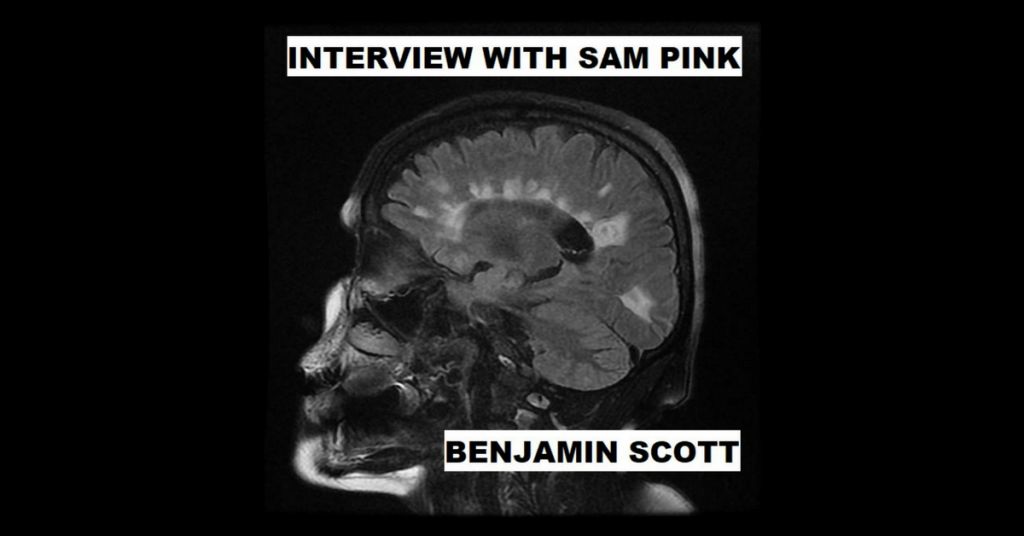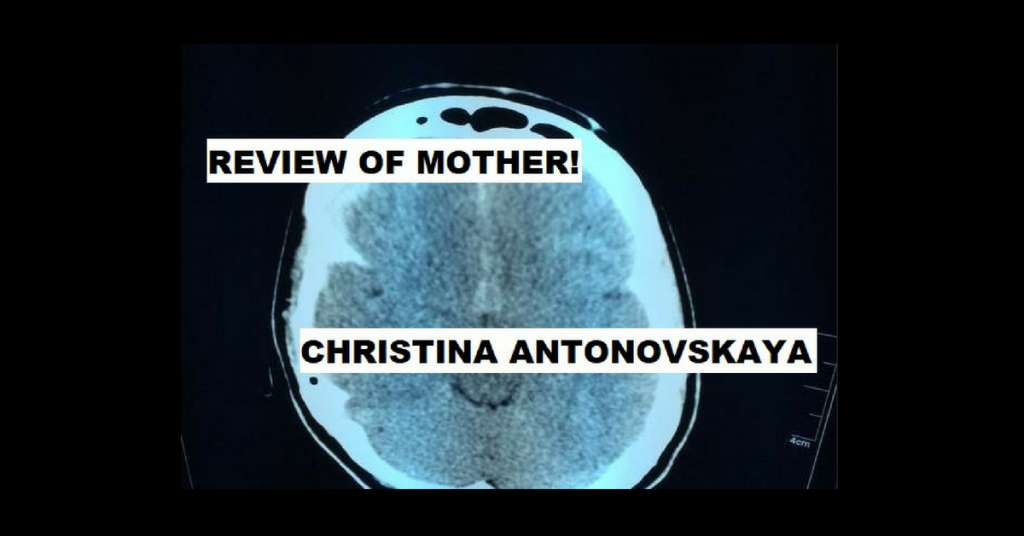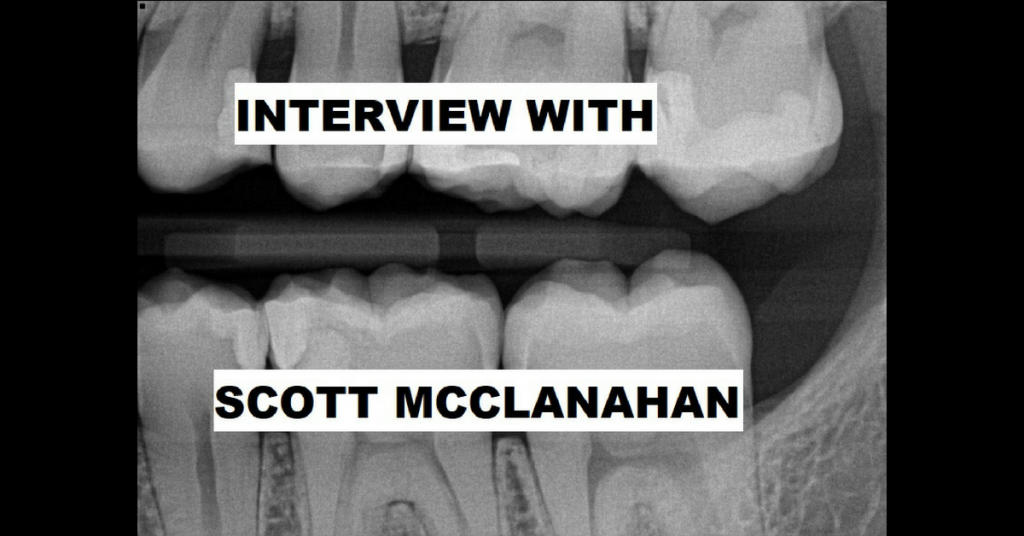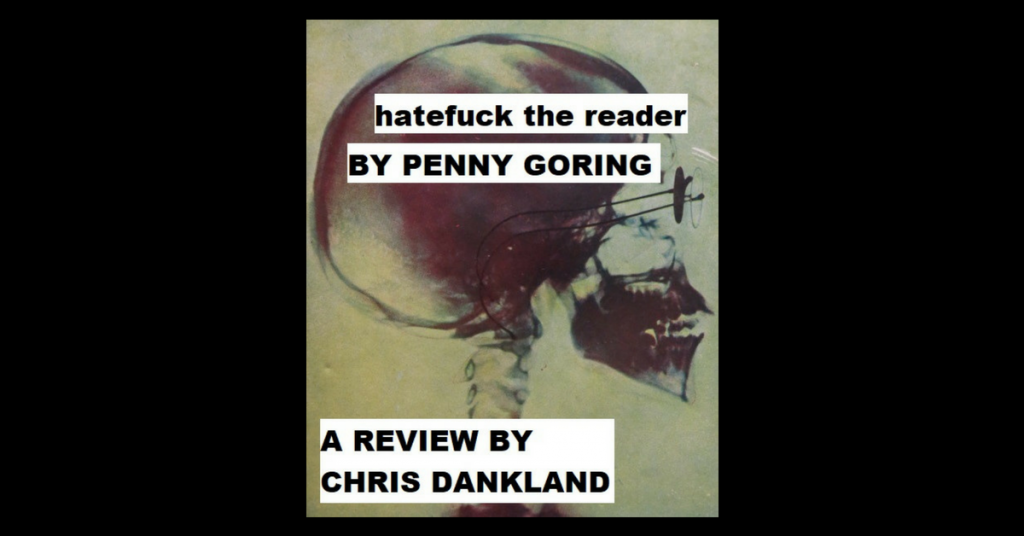Scott McClanahan is the author of The Sarah Book, The Incantations Of Daniel Johnston, Hill William, Crapalachia, and The Collected Works of Scott McClanahan Vol. 1. He is the owner the finest small volume library in the state of West Virginia.
What’s a book that first put the hook in your heart? Or if there isn’t a single book or author that got you hooked on reading, maybe you can tell me what age you were when literature started playing the pied piper song to you.
I think I’ve always fetishized books. There was a ton of children’s stories my mom used to read to me. “The Little Fir Tree” and “The Shoemaker and the Elves.” The stories she told me about herself were just as important though. I checked out John Steinbeck’s Of Mice and Men from the Rainelle Public Library when I was in fifth grade. My mom said, “You’ll like this. He’s easy to read.” I read that book the same weekend I played Tecmo Bowl for the first time. Sort of a life changing weekend. I was a weird kid though, reading a lot of biographies. Weird shit like Oliver North’s autobiography and Norman Schwarzkopf.
I think probably the book that made me start discovering things was a biography of Jim Morrison called No One Here Gets Out Alive. It’s embarrassing to say, but true. I found out about Antonioni, Artaud, Godard, Van Morrison, Tennessee Williams’ The Glass Menagerie, Beat writers, Saint Exupery’s The Little Prince. It was all stuff that I had absolutely no access to in West Virginia. That would have been in the 8th or 9th grade. I always used books to find out about other books.
I used to imagine books before I read them just simply because I couldn’t find them. I don’t know if we do that anymore in the age of on-line books. I used to imagine what a book was like and sadly the book was never able to measure up. I remember reading about The Executioners Song in high school for a long time before I actually found a copy. I used to read the World Book Encyclopedia and that book was mentioned in three different places, but then when I read the book I was like, “This sucks.” I feel differently now, but you know.
IMPORTANT BOOKS TO ME (MINUS ISAK DINESEN, JEAN RHYS, JOHN AUBREY)
The Collected Short Prose of James Agee
The Life of Alexander the Great by Plutarch
Mishima: A Biography by John Nathan
The Portable Rabelais (The Viking Portable Library) by Francois Rabelais
First Love by Ivan Turgenev
My Life by Benvenuto Cellini
An Egyptian Childhood by Taha Hussein
A Christmas Memory: One Christmas, and The Thanksgiving Visitor by Truman Capote
The Western Lands by William S. Burroughs
Pages From A Cold Island by Frederick Exley
Death On The Installment Plan by Celine
Epitaph Of A Small Winter by Machado de Assis
The Heart Is A Lonely Hunter by Carson McCullers
The Nick Tosches Reader
Ravelstein by Saul Bellow
The Whole Motion: Collected Poems by James Dickey
Careless Love: The Unmasking Of Elvis Presley by Peter Guralnick
Do you read compulsively? Do you feel like reading is an addiction for you, sometimes? What do you think is the main driving force behind your desire to read more and more books? Are you looking for something?
Yeah I’m compulsive. Reading has always been kind of weird necrophilia. I can’t think of a more intimate act with a living writer as well than reading. The only thing that can compete with it is music and even that’s not the same. I usually go through 2-3 books a week. I’m sure it’s tied in to OCD or some slight autism. I always think of that robot from Short Circuit. Need more input. At this point I don’t think I’m looking for anything. But when I find a new writer like Machado De Assis or Lu Xun (two writers I read for the first time last year) it feels like a conjuring. I may be the only person who went bankrupt buying books.
BEST BOOKS I'VE READ IN THE LAST SIX MONTHS
Tonight I'm Someone Else by Chelsea Hodson
Roughing It by Mark Twain
garden, ashes by Danilo Kis
The Garbage Times / White Ibis by Sam Pink
The Collected Essays of Elizabeth Hardwick
Gargoyles by Thomas Bernhard
Memoirs From The House Of The Dead by Fyodor Dostoevsky
Roland Barthes by Roland Barthes
Coma by Pierre Guyotat
The War by Marguerite Duras
The Kingdom by Emmanuel Carrere
The Anatomy Of A Moment by Javier Cercas
Dom Casmurro by Machado de Assis
Wartime Lies by Louis Begley
The Death of Artemio Cruz by Carlos Fuentes
Outline by Rachel Cusk
The Atlas by William T. Vollmann
How often do you put a book down? Do you have rules about how much of a chance you’ll give a book before moving on to something else? If I book doesn’t catch me by page 75, I usually throw it out. But some books are late bloomers.
I don’t put down any books usually. I have lists of books that I want to read. If it gets slow, I start to skim and sometimes by skimming you can get back inside the book again. Most of the times I’ve read about the book so much that I know I want to read it. This is what is in my Amazon cart right now.
Denton Welch, In Youth is Pleasure
George Perec, Life: A Users Manual.
Imre Kertesz, Fatelessness
Nathalie Sarraute, Tropisms
Daphne du Maurier, Rebecca
Sei Shonogan, Pillow Book
Rebecca West, The Return of the Soldier
Gustaw Herling, A World Apart
Anita Brookner, Look at Me
Hopefully someone will buy these books for me and send them to me.
IMPORTANT BOOKS TO ME
The Pump House Gang by Tom Wolfe
Nothing Like The Sun by Anthony Burgess
Rimbaud Complete (Modern Library Classics) by Arthur Rimbaud
Justine by Marquis de Sade
King Of The Jews by Nick Tosches
The Thief's Journal by Jean Genet
Miracle Of The Rose by Jean Genet
Nikolai Gogol by Vladimir Nabokov
The Selected Letters of John Keats
The Autobiography of Alice B. Toklas by Gertrude Stein
My Childhood by Maxim Gorky
The Bible
Martial's Epigrams
Confessions of Zeno by Italo Svevo
The Master and Margarita by Mikhail Bulgakov
Our Town by Thornton Wilder
The Diary of Samuel Pepys
You seem to read a lot of biographies, which is a big blank spot in my reading life. Can you recommend five or six great biographies that I should read this year?
Oh I don’t know. I guess these are my favorites.
Elizabeth Gaskell Life of Charlotte Bronte, Richard Holmes: The Pursuit: A Life of Shelley, James Boswell: The Life of Johnson, Emanuel Carrere: Limonov; and I am Alive and You Are Dead: A Journey into the Mind of Philip K. Dick, Enid Starkie’s Rimbaud and Baudelaire. Ellmann’s Oscar Wilde. Judith Thurman’s bio of Isak Dinesen is pretty great.
I also love a book by Gorky called Reminiscences’ of Chekhov, Tolstoy and Andreyev. Not a biography, but just these little moments or impression and anecdotes. The description of Tolstoy’s hands is something else and easily tells us more than a 1,000 page biography would.
THE BEST BOOK THAT NO ONE HAS EVER READ
Reminiscences Of Tolstoy, Chekhov, and Adreyev by Maxim Gorky
Does a biographer need to be trustworthy, for you? Should a biographer carefully research a life and stick to the facts as much as possible, like a journalist? Or should a biographer just try to tell the most interesting and entertaining and compelling story they can, even if it involves exaggerating or making up lies? Does a journalist need to be trustworthy?
1. No. 2. Not necessarily. 3.Yes to an extent. 4. Yes trustworthy journalists are essential to any representative republic.
IMPORTANT BOOKS TO ME
Poems by Pier Paolo Pasolini
Criminal Desires: Jean Genet And Cinema by Jane Giles
Selected Poems And Prose by Paul Celan
Classic Crews: A Harry Crews Reader
The Complete Poems Of John Keats
Hellraisers: The Life and Inebriated Times of Richard Burton, Richard Harris, Peter O'Toole, and Oliver Reed by Robert Sellers
The Beleaguered City by Shelby Foote
Patriotic Gore: Studies In The Literature Of The American Civil War by Edmund Wilson
The Lives Of The Artists by Giorgio Vasari
The Painted Bird by Jerzy Kosinski
The Creators: A History Of The Heroes Of The Imagination by Daniel J. Boorstin
Oscar Wilde by Richard Ellmann
You Can't Win by Jack Black
The Sarah Book by Scott McClanahan
The Life Of Samuel Johnson by James Boswell
Sex and Rockets: The Occult World of Jack Parsons by John Carter
New York Tyrant Vol 1 Number 1
Seven Plays by Sam Shepard
In an interview, you said: “I don’t think there’s a novelist today who can even compare with Robert Caro.” What do you like about his biographies? What can novelists learn from him?
Oh the usual. I think all great writers have just three skills. The ability to surprise and transform, the ability to propel you through a narrative, the ability to conjure emotion or laughter in a reader. Caro and John Richardson and Hilary Spurling and Jimmy McDonough all have that. Even some of our best writers can only do two out of those three things. Somehow I feel like biography still feels sort of primal or primitive and still connected to something very old in stories and magic. They're sort of still interested in these things. Also, some of these folks are spending whole decades writing these books. I'm talking about losing homes and running through advances in order to make something. I think that's beautiful and almost monastic in the age of corporate fiction, and experimental tenure fiction.
IMPORTANT BOOKS TO ME
Joe Gould's Secret by Joseph Mitchell
Monsieur Proust by Celeste Albaret
The Civil War: Volume 3: Red River to Appomattox by Shelby Foote
Tao Te Ching by Lao Tzu
Finnegans Wake by James Joyce
Selected Writings by Gerard de Nerval
Lectures On Russian Literature by Vladimir Nabokov
The Rise And Fall Of Athens by Plutarch
A Confederate General From Big Sur / Dreaming Of Babylon / The Hawkline Monster by Richard Brautigan
Collected Poems by Dylan Thomas
The Complete Works Of Nathanael West
Genet by Edmund White
The Twelve Caesars by Suetonius
Selected Writings by Antonin Artaud
If you had all the time in the world, whose biography would you write? (I’m thinking about a famous person or a historical person, but it could be anyone.) Would you be a trustworthy biographer?
I’m going to write about my mom and dad. So no. It’s going to be a book called Vandalia or Rainelle Stories or something like that. A big family book. Like a Tristam Shandy or Rabelais almost. I’m going to see if I can’t take what I’ve learned from these books and write about two people who are just ordinary. I'm going to write it for my kids. Been struggling for six months though so who knows. This writing shit is hard.
BOOKS I'M READING/REREADING FOR THE BOOK I'M WORKING ON
Reminiscences Of Tolstoy, Chekhov, and Adreyev by Maxim Gorky
Tristram Shandy & Sentimental Journey by Laurence Sterne
Hopscotch by Julio Cortazar
Montano's Malady by Enrique Vila-Matas
The Things They Carried by Tim O'Brien
The Oresteia by Aeschylus
True Stories by Sophie Calle
Soldiers of Salamis by Javier Cercas
Memoirs From Beyond The Tomb by Francois-Rene de Chateaubriand
This Is Not A Novel And Other Novels by David Markson
Dark Back Of Time by Javier Marias
One Hundred Years Of Solitude by Gabriel Garcia Marquez
The Collected Writings Of Joe Brainard
Bartleby & Co. by Enrique Vila-Matas
King Lear by William Shakespeare
The Rings of Saturn by W.G. Sebald
Vertigo by W.G. Sebald
In Search Of Lost Time Volume 6: Time Regained by Marcel Proust
The Glass Menagerie by Tennessee Williams
Les Miserables by Victor Hugo
The Gulag Archipelago by Aleksandr Solzhenitsyn
What are some poems or other pieces of literature that you have memorized and could recite at any time? Do you have a trick for memorizing things like that, or just have a good memory?
Oh gosh I have reams of stuff. I've known Whitcomb Riley's "Little Orphan Annie" since I was a boy. I've done that so many times in readings I'm sure people are sick of it, but it makes me think of my mom. There's some Neruda I know, a section of Under Milk Wood, John Donne always kills. I used to do a section of Virgil's Georgics in a reading. I don't know if it's a trick, but I can memorize pretty easy. I've always liked doing it in readings because it gives you an element of control. You can move around, etc. I wanted to memorize the whole of Sarah Book for these final readings I was going to do, but I ran out of time.
IMPORTANT BOOKS TO ME
The Portable John Steinbeck
The Red And The Black by Stendhal
The Autobiography of Benjamin Franklin
The Right Stuff by Tom Wolfe
Ramones by Nicholas Rombes
Limonov by Emmanuel Carrere
The Blacks: A Clown Show by Jean Genet
The Art Of Destruction: The Films Of The Vienna Action Group by Stephen Barber
Of Walking In Ice by Werner Herzog
Swann's Way by Marcel Proust
The Book Of Laughter And Forgetting by Milan Kundera
Ferdydurke / Pornografia / Cosmos by Witold Gombrowicz
The Little Prince by Antoine de Saint-Exupery
Odi Et Amo: The Complete Poetry of Catullus
Laughable Loves by Milan Kundera
Lost Highway: Journeys And Arrivals Of American Musicians by Peter Guralnick
My Mother's House and Sido by Colette
Who are some of the readers, living or dead, that you most admire?
I guess Amelia Gray is always the gold standard. Lindsey Hunter as well. I think Sam Pink is the most likable reader I've ever watched. He just has that quality about him. People like him. Chelsea Hodson is a great reader too. I saw Kiese Laymon read in Iowa City a few years ago and he really blew me away. It sort of feels like readings are dead now or something, but maybe that's just me. Five years ago people used to talk about them more and seem excited. Now it seems like they've dried up or something. I had a great time though at the Franklin Park Reading Series a month ago, which is easily the best reading series in the country.
Oh and I'm biased, but I saw Juliet Escoria give a reading with a video back drop in Brooklyn a few years ago. It was with some witches. One of the top three readings I've ever seen.
IMPORTANT BOOKS TO ME
Son Of The Morning Star: Custer And The Little Bighorn by Evan S. Connell
Lipstick Traces by Greil Marcus
The Big Sea by Langston Hughes
The Education Of Henry Adams by Henry Adams
Boswell In Holland, 1763-1764 by James Boswell
Cruising Paradise by Sam Shepard
Nothing If Not Critical: Selected Essays On Art And Artists by Robert Hughes
Voyage In The Dark by Jean Rhys
The Poems Of Francois Villon
William Faulkner And Southern History by Joel Williamson
Satan Is Real: The Ballad Of The Louvin Brothers by Charlie Louvin
Psychotic Reactions And Carburetor Dung by Lester Bangs
The Georgics by Virgil
interview by Chris Dankland READ NEXT: INTERVIEW WITH SAM PINK




